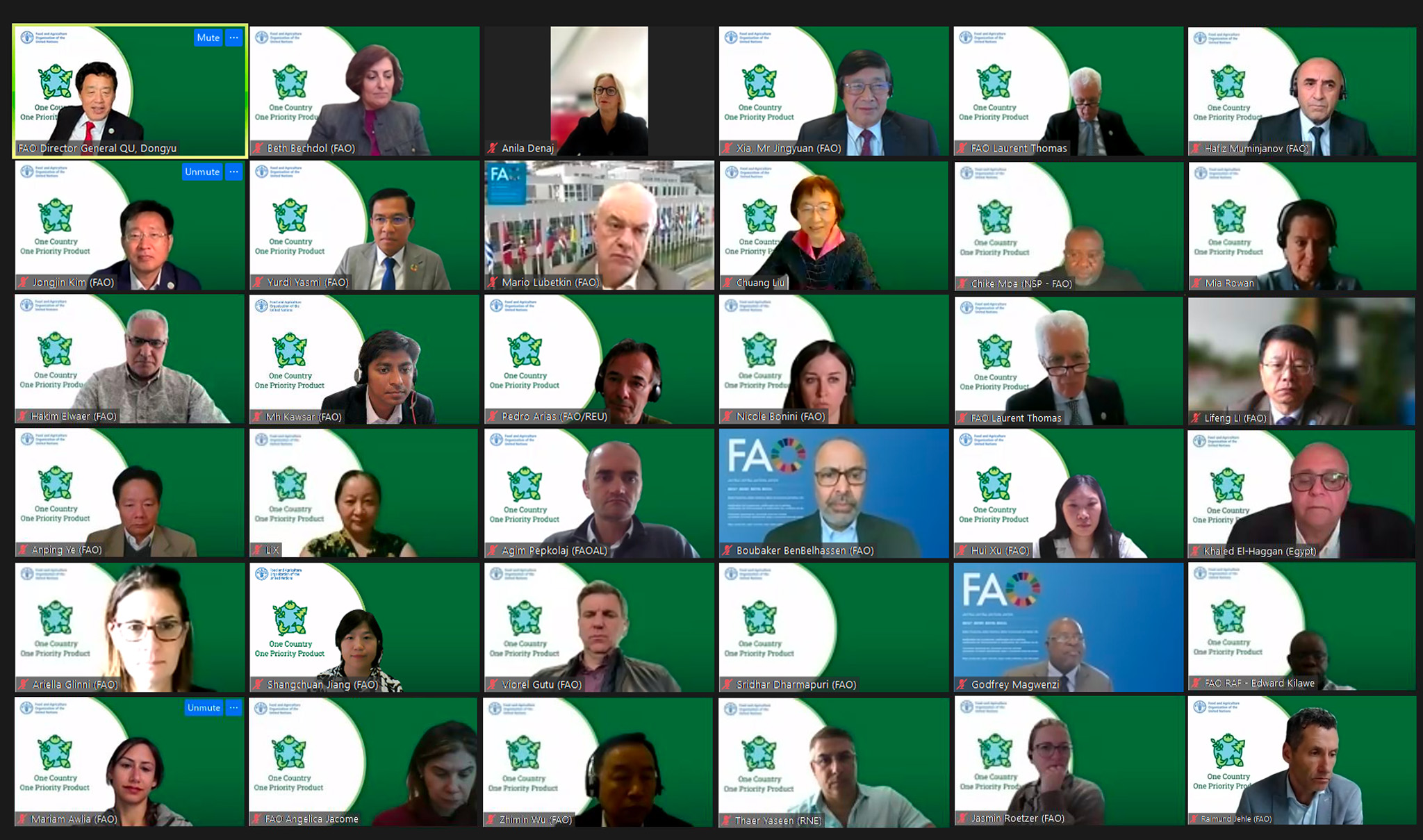News
Looking to the future of the One Country One Priority Product initiative

FAO Director-General QU Dongyu sharing his remarks as the Chair of the OCOP Steering Committee.
©FAO
Rome - Starting from grassroots to the global level, special agricultural products are being promoted to boost livelihoods in different countries across the world, thanks to the collaboration of governments, academia, research, private sector, and other partners under the OCOP initiative. On 26 April, speakers at the second meeting of the OCOP Steering Committee commended the established partnerships that have been consolidated and as well as the initiative's achievements as they looked to establish priorities.
FAO Director-General QU Dongyu emphasized the importance of tapping into the potential of Special Agricultural Products (SAPs) such as the underutilized crops as well as forestry and livestock products selected by countries to improve people’s livelihoods, provide better income, and boost nutrition. For large-scale implementation, he advised prioritizing: increasing the visibility and impact of the OCOP, mobilizing resources, and building synergies with other FAO initiatives, such as the Hand-in-Hand, the Digital Villages, and the Green Cities Initiatives.
Delivering a national perspective, H.E. Anila Denaj, the Minister for Agriculture and Rural Development of the Republic of Albania, spoke about her country’s early success in developing the sustainable production of chestnuts through the OCOP. She highlighted that the government is developing their sustainable production using biopesticides for pest control as well as expanding cold storage and processing to strengthen livelihoods and improve diets. “Through this project, we are bringing life to remote areas and, of course, consumers will enjoy a high-quality chestnut,’’ she told the meeting.
Reflecting on the regional perspective, Abebe Haile-Gabriel, FAO Assistant Director-General, and Regional Representative for Africa, shared that many countries had already shown strong interest in the OCOP and emphasized the need to adopt ‘’an integrated approach’’ drawing on science and technology, while building capacity and value chain development. “We need to promote engagement at all levels and carefully document best practices,’’ he said, among other recommendations.

Snapshot from the OCOP second steering committee meeting. ©FAO/MH Kawsar Rudro
From a research perspective, Chuang Liu, Professor and Director of the Institute of Geographic Sciences and Natural Resources Research of Chinese Academy of Sciences, highlighted the importance of geographical indications for environment and sustainability, which promotes monitoring of the ecological environment related to the geographical habitat and product development, by using the Internet of Things (IoT) and big data system. Professor Liu emphasized that the methodology and technology are accessible to all the OCOP countries. Additionally, training is available to increase access to related data and knowledge.
Speaking from an education perspective, Pathmanathan Umaharan, Professor and Director of the Cocoa Research Centre of the University of the West Indies in Trinidad and Tobago, provided insights on improving the cocoa industry, whose production has declined in the island nation over the past century. “Attracting investment is key to support the development of the cocoa sector and requires establishment of efficient private sector services, such as training,” he said, underscoring the importance of public-private partnerships, institutional coordination, digital learning platforms and interactive apps.

A farmer working in a date palm farm in Wadi Natroun, Egypt. ©FAO/Ahmed Elsheemy
From a private sector perspective, Khaled El-Haggan, Chairperson of Date Palm Committee at the Egyptian Agriculture Export Council and member of the OCOP National Task Force in Egypt, outlined the current progress of the OCOP initiative on date palm in Egypt. A Palm Academy was established, an international market research was conducted and a climatic map of 26 date varieties had been drawn up, he said. “Marketing, not sales, should be integral to all activities,” El Haggan suggested, to prioritize the environmental sustainability in production, processing, and marketing of special products.
Hafiz Muminjanov, FAO OCOP Global Coordinator, provided an update on the OCOP implementation at the global level and informed the meeting that USD 18 million had been mobilized from various sources to support 60 countries. To date, 85 Members from all five FAO Regions have expressed strong interest in promoting the sustainable development of the value chains of 54 SAPs. A total of 16 demonstration countries have been supported as to guide and facilitate the OCOP implementation in other countries.
Yurdi Yasmi, FAO Special Coordinator, facilitated a general discussion on ensuring financial support, promoting large-scale implementation, building synergies with other initiatives, and enhancing communication and outreach.
In her closing remarks, Beth Bechdol, FAO Deputy Director-General, said the meeting had underscored the sense of urgency and the need to manage resources effectively to maintain the momentum of the OCOP initiative. She urged everyone involved to share the stories that attest to the power and potential of their products.
- FAO’s One Country One Priority Product initiative celebrates milestones and aims for scaled implementation
- One Country One Priority Product (OCOP)
- Countries and Special Agricultural Products by Regions
- Video on OCOP initiative
- The Hand-in-Hand Initiative
- Digital Villages Initiative in Europe and Central Asia
- Green Cities Initiative
- FAO South-South Cooperation Gateway
- Flexible Voluntary Contribution (FVC)
